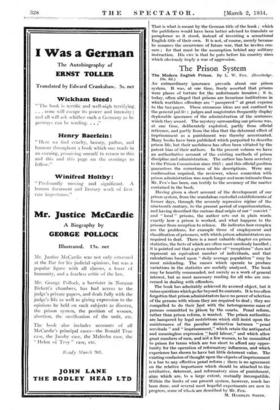The Prison System
The Modern English Prison. By L. W. Fox. (Routledge. 10s. 6d.) Ax extraordinary ignorance prevails about our prison system. It was, at one tine, freely asserted that prisons were places of torture for „the unfortunate inmates ; it is, today, often alleged that prisons are luxurious institutions in which worthless offenders are " pampered " at great expense to the tax-payer. These erroneous ideas are not confined to the general putlic ; judges and magistrates frequently display deplorable ignorance of the administration of the sentences which they award. The mystery surrounding our prisons was, at one time, deliberately exploited, partly from official reticence, and partly from the idea that the deterrent effect of imprisonment as a punishment was thereby accentuated. Many books have been published which purported to describe prison life, but their usefulness has often been vitiated by the patent bias of their authors. In the present volume we have an authoritative account of the existing methods of prison 'discipline and administration. The author has been secretary to the Prison Commission since 1925 ; and this official position 'guarantees the correctness of his descriptions. Were any confirmation required, the reviewer, whose connexion with prison administration was much longer and more intimate than Mr. Fox's has been, can testify to the accuracy of the matter contained in the book.
Having given a short account of the development of our prison system, from the scandalous custodial establishments of former days, through the severely repressive regime of the nineteenth century, to the present period of experimentation, and having described the curious dual origin of our " convict " and " local " prisons, the author sets out in plain words exactly how a prison is worked, and what happens to the prisoner froin reception to release. He indicates how complex are the problems, for example those of employment and classification of prisoners,' with which prison administrators are required to deal. There is a most valuable chapter on prison statistics, the facts of which are often most carelessly handled ; it is pointed out that a given number of " receptions " does not
represent an equivalent number of individuals, and that calculations based upon " daily average population " may be most misleading. The causes which operate to produce variations in the statistics are usefully analysed. The book may be heartily commended, not merely as a work of general interest, but as most necessary reading for all who are con- cerned in dealing with offenders.
The book has admirably achieved its avowed object, but it
raises questions which go far beyond its contents. It is too often forgotten that prison administrators have no power of selection of the persons with whom they are required to deal ; they are compelled to do their pest with the heterogeneous mass of persons committed to prison by 'the courts. Penal reform, rather than prison refOrm, is wanted. The prison authorities are hampered by legal restrictions which still insist upon the maintenance of the peculiar distinc6on between " penal servitude " and " imprisonment," which retain the antiquated and meaningless expression " hail labour," and which allow great numbers of men, and not a few women, to be committed to prison for terms which are too short to afford any oppor- tunity for the operation of reformatory influences, and which experience has shown to have but little deterrent value. The existing confusion of thought upon the objects of imprisonment is a bar to any effective penal reform ; there is no agreement on the relative hnportance which should be attached to the retributive, deterrent, and reformatory aims of punishment, aims which ' are, to a large extent, mutually incompatible. Within the limits of our present system, however, much has been done, and several most hopeful experiments are now in progress, some of which are described by Mr. Fox.
M. H.A.ArmaN %urn.




























































 Previous page
Previous page